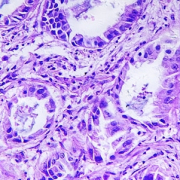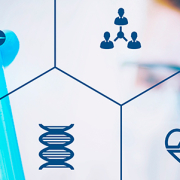Genomics and the future of healthcare
Genomics is changing the future of healthcare and medicine – what does this mean for health professionals and their practice?
Most health professionals have heard of genomics by now, if only in the news. Scientific progress has been so rapid that what was impossible yesterday is becoming possible, even routine, and healthcare applications are no exception. However, aside from cancer and rare disease, those twin pillars of the 100,000 Genomes Project where genomics can offer immediate and significant benefits for patient care, how will it change the practice of other health professionals?
Primary and community care
Pharmacists need to keep up with the fast-moving changes in therapeutics, notably ‘companion diagnostics’, essential genetic tests that accompany cancer treatments targeted at genetic tumour features. Advances in pharmacogenomics mean that there is also slowly increasing scope for other drug labels to incorporate genetic information, warning that doses may need radical readjustment for individuals with genetic variants that affect the way they metabolise those drugs. Currently, genetic tests are directed only for treatments with the most significant effects (and potential side effects), but as costs fall – and miniature DNA sequencers become more common – scope for rapid, point-of-care testing kits is increasing.
General practitioners may similarly use such POC tests to inform prescribing in the future; if genome sequencing results form part of patient digital health records, a simple computer query may be sufficient. Meanwhile, genomics is more of a headache than anything else for many GPs, as they try to distinguish between patients who could benefit from referrals for genetic testing because an inherited disease is suspected, and those who would not, but may be worried anyway, perhaps because of results from direct-to-consumer health or wellness genetic testing. Whilst information from such tests often has little or no significant clinical value at present, similar testing in the future could help chose the best medicines and avoid adverse drug, disease and dietary interactions.
Secondary and tertiary care
In most other medical specialties, doctors and nurse practitioners may have a subset of patients with an inherited form of disease or predisposition who could benefit from genetic testing. In some cases, results could directly inform management, for example of different forms of inherited cardiac conditions. In others, it may make little difference, but suggest that other family members or future children could also be at risk of the same condition. Using POC tests to assess patient samples for infectious disease agents and what antibiotics they may be vulnerable to could also help with infection and outbreak control in hospitals.
Looking further
In the longer term, both prevention and management of disease may change; implantable sensors and remote monitoring technologies could detect genomic and many other biomarkers of health and disease in real time, perhaps alongside exercise and dietary information, or the composition of our gut microbiome. Advanced computing capacity could integrate this with other medical data and analyse it to provide patients and health professionals with the best options for behavioural or therapeutic interventions.
Meanwhile, getting to grips with genomics makes sense. Enthusiasts will wish to consider the flexible Master’s in Genomic Medicine course, but there are plenty of other options, not least the varied set of CPD modules. These begin with the basics, but also offer opportunities to dig deeper in more specialised healthcare applications, or to learn from examples of genomic practice in your own NHS workplace. There are even some free online courses, if you prefer to learn on your own; choose whatever suits, and ensure that this ‘genomic revolution’ doesn’t catch you unawares.
–









